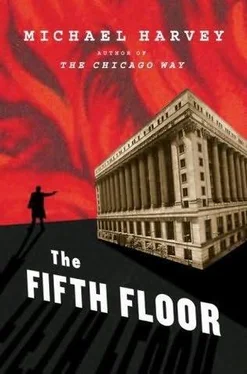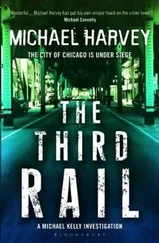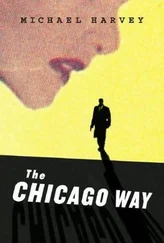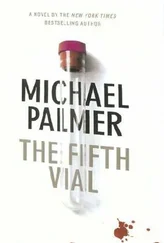Michael Harvey - The Fifth Floor
Здесь есть возможность читать онлайн «Michael Harvey - The Fifth Floor» весь текст электронной книги совершенно бесплатно (целиком полную версию без сокращений). В некоторых случаях можно слушать аудио, скачать через торрент в формате fb2 и присутствует краткое содержание. Жанр: Полицейский детектив, на английском языке. Описание произведения, (предисловие) а так же отзывы посетителей доступны на портале библиотеки ЛибКат.
- Название:The Fifth Floor
- Автор:
- Жанр:
- Год:неизвестен
- ISBN:нет данных
- Рейтинг книги:3 / 5. Голосов: 1
-
Избранное:Добавить в избранное
- Отзывы:
-
Ваша оценка:
- 60
- 1
- 2
- 3
- 4
- 5
The Fifth Floor: краткое содержание, описание и аннотация
Предлагаем к чтению аннотацию, описание, краткое содержание или предисловие (зависит от того, что написал сам автор книги «The Fifth Floor»). Если вы не нашли необходимую информацию о книге — напишите в комментариях, мы постараемся отыскать её.
The Fifth Floor — читать онлайн бесплатно полную книгу (весь текст) целиком
Ниже представлен текст книги, разбитый по страницам. Система сохранения места последней прочитанной страницы, позволяет с удобством читать онлайн бесплатно книгу «The Fifth Floor», без необходимости каждый раз заново искать на чём Вы остановились. Поставьте закладку, и сможете в любой момент перейти на страницу, на которой закончили чтение.
Интервал:
Закладка:
I rubbed a thumb along my lower lip and walked slowly back down Hudson. Johnny Woods had been in the house thirty, forty seconds, tops. He could have killed someone. Could have robbed the place. Could have raided the refrigerator and been done with it. None of those, however, seemed likely. I figured Johnny Woods went to the house looking for someone or something. Whatever he found inside had surprised him. And scared him. All of which interested the hell out of me.
CHAPTER 7
I took a look up and down Hudson before I approached the house. The street was empty, quiet except for a few birds having some fun next door. I slipped on a pair of leather gloves, eased my gun off my hip, and held it by my side as I walked up the stairs. The front door was still ajar. I pushed it open with my foot. Nothing. I walked inside and found myself in a small parlor, a greeting area with a coat stand against the wall. It held a trench coat on a hook and a wooden-handled umbrella. Underneath, I noticed a pair of men’s boots. They were dry and looked like they’d been that way for a while. I crept out of the parlor and into a large sitting room. Sun streamed through the stained glass and threw a rainbow of color across walls washed in cream. The floor and furniture were made of lightly varnished wood, thick, shiny, and smelling of soap and lemon. To my left, a grandfather clock ticked away the morning. Softly. To my right, a mahogany banister leisurely carried a flight of stairs to the cottage’s second floor. All in all, it was peaceful, pleasant, a nurturing sort of place-that is, until my eye reached the top of the stairs. It was there I saw the old man, hanging from a well-crafted bit of railing by what appeared to be a good strong length of rope.
I took the stairs one at a time, got to the top, and moved past the body. There was one bedroom and what looked like a study upstairs. Both empty. I went back downstairs, checked the kitchen and a small basement. Also empty. I put my gun back on my hip and went upstairs a second time. The old man was hanging against a run of turned balusters. The rope was looped under his shoulders and tied off back under the railing. I crouched down, reached through the wooden pegging, and turned the body, just enough to get a look at the face. It was a refined face. A face of education. Of culture. Probably the face of a grandfather. At least it had been. Now the face was tinged with blue, which told me whoever I was looking at had died from a lack of oxygen. I didn’t think it was the rope, however, that did it. Mostly because it wasn’t looped around the corpse’s neck. Also, because the dead man’s mouth was stuffed to overflowing with sand.
I hadn’t seen anyone suffocated with sand before and wasn’t quite sure how a detective should proceed. I sat back for a minute and considered. The corpse didn’t seem to mind the wait. His eyes were open when he died. Now he just looked at me and dangled. I took a letter from my pocket. It was actually an electric bill, overdue by at least three months. The hell with ComEd. I slipped a little bit of the sand out of my new friend’s mouth and into the envelope. Then I gently reached over and went through his pockets. In his shirt pocket, I found a set of reading glasses. The rest were empty. I thought about searching the house. Then I thought about Johnny Woods. Maybe he ran away. Maybe he ran to the nearest phone and dialed up Chicago’s finest. I figured my work here was done and headed for the exit.
The street was as quiet as I’d left it. No cops waiting at the curb. No neighbors peeking through the shades. I decided to push my luck and took a quick turn around the yard. The back door was locked. The windows looked undisturbed. Facing into the alley, I found a garage with a Lexus parked inside. Near a corner of the building, I saw what looked like fresh scratches in the dirt. The soil underneath was loose and quick through my fingers. I pulled out the envelope and checked the sample I’d taken from the crime scene against the soil from the yard. Close, but no cigar. My victim had been suffocated with what looked like beach sand, which meant whoever killed the old man had come prepared for the job. I walked back to the front of the house and was about to step onto the sidewalk when I noticed a small plaque. It was set a few feet off the ground, just to the right of the porch. I moved close and read the inscription.
THIS IS POLICEMAN BELLINGER'S COTTAGE.SAVED BY HIS HEROIC EFFORTS FROM THE CHICAGO FIRE.OCTOBER 1871.
I made my way back to Clark Street and walked five blocks north, to a steam shop called Frances’. It had been in business since 1938, which was long enough for me. I ordered a bowl of chicken noodle soup, the old-fashioned kind, with thick noodles, real chunks of chicken, and broth that warmed from the inside out. I loaded it up with pepper and enjoyed. When I was finished, I stepped to the back of the shop and found one of the few pay phones in existence on Chicago’s North Side. I dropped a quarter and called in the body on Hudson to the police. Then I went back to my table and ordered a corned beef sandwich on marble rye and coffee. Whatever Johnny Woods was up to, it wasn’t good. I didn’t think, however, it added up to murder. Then again, there was at least one corpse in a house on Hudson that might beg to disagree.
CHAPTER 8
T he next day I got to my office early. Broadway was being repaved for the fifth time in the past three years. The Vatican had Michelangelo, a single man lying on his back, painting a chapel. Chicago has city workers, four to a shovel, filling potholes and pulling down twenty-five bucks an hour. Either way, it seemed to be a lifetime’s worth of work.
I closed the blinds in an attempt to shut out the noise. The jackhammer, however, would have its way. I sighed, put my feet up on the desk, and opened up the Tribune. David Meyers’ afternoon at Hawkeye’s had dropped to page two. The body on Hudson was buried, literally. An inch or so of column space on page thirty-four. No hint of foul play. No mention of a mouth full of sand. Just a dead guy found inside a house. His name was Allen Bryant. He was seventy-five years old and lived alone, an amateur historian with a special interest in the Chicago Fire. Bryant, it seems, was the great-great-grandson of the home’s original occupant, a cop named Richard Bellinger, and kept the house as a tiny monument to the fire. I didn’t know where any of this was going. Except nowhere. I also didn’t know why the police seemed to be covering up a homicide. I knew, however, where I could get some answers. Or at least some creative outrage. I picked up the phone and dialed.
“What do you want?”
Dan Masters was named in the article as a working detective on the Bryant case. He wasn’t exactly a friend. More like the Catullus poem I had shared with my client. I hate and I love. In Masters’ case, it was mostly hate.
“You in the office today?” I said.
“Depends. Are you planning on coming in?”
“I was.”
“Then I’m out.”
“You may want to stick around.”
“Why?”
“The homicide on Hudson. I read in the paper you’re working that.”
“I caught the call. Not sure if we’re going to work it as a homicide yet.”
“Really?”
“Really.”
“You find a lot of seventy-five-year-old guys in their homes with their mouths stuffed with sand?”
No response.
“Didn’t think so.”
“Fucking Kelly. You called it in.”
“I’ll be over in a half hour.”
“Bring your lawyer.”
“I won’t need one.” I hung up the phone and headed out to see my pals at the Chicago PD.
CHAPTER 9
M asters was working out of the Nineteenth District, at the corner of Belmont and Western on Chicago’s North Side. I got there a little after two p.m. and was ushered into a large room jammed with detectives and their desks, in varying states of decay and disarray. Cops call it the bull pen.
Читать дальшеИнтервал:
Закладка:
Похожие книги на «The Fifth Floor»
Представляем Вашему вниманию похожие книги на «The Fifth Floor» списком для выбора. Мы отобрали схожую по названию и смыслу литературу в надежде предоставить читателям больше вариантов отыскать новые, интересные, ещё непрочитанные произведения.
Обсуждение, отзывы о книге «The Fifth Floor» и просто собственные мнения читателей. Оставьте ваши комментарии, напишите, что Вы думаете о произведении, его смысле или главных героях. Укажите что конкретно понравилось, а что нет, и почему Вы так считаете.












